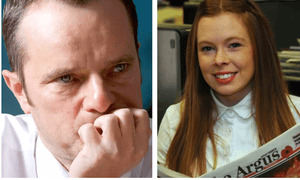
The resignation of Lucy Pearce after just two weeks as editor of the Brighton Argus took many observers by surprise.
It is possible to view her decision as a slap in the face for the Argus’s owner, Newsquest/Gannett. But it should also be seen as a slap in the face for the entire newspaper industry.
On the face of it, Pearce’s appointment was a wonderful story. A woman of 28 had landed the key editorial post at a daily paper. Reputed to be the youngest person ever to get the job, she was also reported on the Argus website to be “Newsquest’s youngest editor.”
At the time, she was quoted as saying: “I am hugely passionate about the Argus and the community it serves.” Not passionate enough, however, once another job offer came along.
An inside source who worked closely with Pearce during her time as head of content told me she was “a cracking journalist” and that her departure was “a real shame.”
The real shame is that, having attained an editorship, she should prefer to accept an offer to be a PR. What does that say about the state of modern journalism?
On hearing the news, a former national paper editor who is now a PR registered his sadness. In acknowledging that it has long been common for veteran journalists to switch from poacher to gamekeeper, he was astonished that a relative newcomer should make such a move.*
It’s what you do at the end of your journalistic career, he remarked, not at the beginning. But times are changing fast. It’s where we are... and where we are going.
There is no longer kudos in becoming an editor, especially at local and regional level. Editors of papers with fast-falling circulations - the Argus barely sells 10,000 copies nowadays - have been robbed of their status.
They lack the influence they once enjoyed among the political and business communities of the towns and cities their papers serve.
Many of them rarely, if ever, leave the office. They are little __more than super chief subs and/or news editors. With young and inexperienced staffs, several spend most of their time as in-house journalism tutors.
Staff turnover is also a problem. Low pay drives away both the young and the old. A great deal __more can be earned in PR, a major lure for men and women trying to support their families amid the wage freezes imposed by corporate owners.
Then, of course, there are the poor prospects in an industry everyone recognises as having an uncertain, and potentially terminal, future.
Pearce’s career trajectory indicates the direction of travel for some of the UK’s best young journalists. She began her career at the Dorset Echo in 2009, moving two years later to the South West News Service, the news agency responsible for producing so many good reporters.
Pearce thrived in her year there and, in 2012, joined the Argus as assistant news editor. She was promoted to be head of content in 2014, a job involving both editorial and commercial duties.
When Mike Gilson was relieved of the editorship in December after just two years at the helm, having failed to convince Newsquest of the need to re-focus the ailing Argus, Pearce was the natural choice to succeed him.
She had been supportive of Gilson, noting at the time of his going that “our team of talented and hard-working journalists” had delivered on his pledge to revitalise the Argus.
But Pearce has preferred to revitalise her life by accepting a position as “communications and engagement manager” at Legal & General (not as “head of communications”, as previously reported).
She will be an internal communications manager in the mature savings business division. She will not act as an external PR.
Doubtless, the move makes financial sense, and I am not being in the least critical of her for seizing such an opportunity. What I am lamenting is that journalism is now playing second fiddle to PR.
If our trade cannot retain such bright prospects as Lucy Pearce then it suggests that our future, already bleak, is utterly hopeless.
*The original posting wrongly said “gatekeeper”!